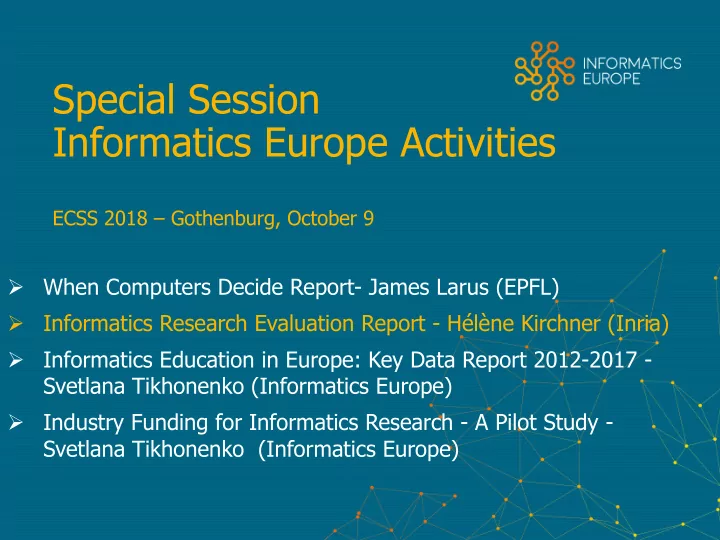

Special Session Informatics Europe Activities ECSS 2018 – Gothenburg, October 9 When Computers Decide Report- James Larus (EPFL) Ø Informatics Research Evaluation Report - Hélène Kirchner (Inria) Ø Informatics Education in Europe: Key Data Report 2012-2017 - Ø Svetlana Tikhonenko (Informatics Europe) Industry Funding for Informatics Research - A Pilot Study - Ø Svetlana Tikhonenko (Informatics Europe)
Informatics Research Evaluation Report Hélène Kirchner, Inria
REPORT Prepared by the Research Evaluation Working Group § Floriana Esposito, Università degli studi di Bari Aldo Moro, Italy § Carlo Ghezzi, Politecnico di Milano, Italy § Manuel Hermenegildo, IMDEA Software Institute and Universidad Politécnica de Madrid, Spain § Helene Kirchner, Inria, France § Luke Ong, University of Oxford, United Kingdom This report focuses mainly on the main principles and criteria that should be followed when individual researchers are evaluated for their research activity in the field of Informatics addressing the specificities of this area.
Research Evaluation Evaluation can be highly effective in improving research quality and productivity. To achieve the intended effects, research evaluation should follow established principles , benchmarked against appropriate criteria , and sensitive to disciplinary differences . Universal criteria do not exist to evaluate research quality This report confirms the findings of the 2008 Informatics Europe report and at the same time incorporates a number of new observations concerning the growing emphasis on collaborative, transparent, reproducible and accessible research.
Informatics and its specificity Some characteristics Informatics is a relatively young science which is rapidly evolving in close connection with technology. Informatics is pervasive and has a high societal and economic impact. • Informatics is an original discipline combining mathematics, science, and engineering. Researcher evaluation must adapt to its specificity.
T he Informatics publication culture and its evolution • A distinctive feature of publication in Informatics is the importance of highly selective conferences. Journals have complementary advantages but do not necessarily carry more prestige. Publication models that couple conferences and journals, where the papers of a conference are published directly in a journal, are a growing trend that may bridge the current gap between these two forms of publishing . • Open archives and overlay journals are recent innovations in the Informatics publication culture that offer improved tracking in evaluation • The order in which a publication in Informatics lists authors is generally not significant and differs across sub-fields. In the absence of specific indications, it should not serve as a factor in the evaluation of researchers.
How to evaluate the impact of research? Multiple Criteria • To assess impact, artifacts such as software can be as important as publications. The evaluation of such artifacts, which is now performed by many conferences (often in the form of software competitions), should be encouraged and accepted as a standard component of research assessment. Another important indicator of impact are advances that lead to commercial exploitation or adoption by industry or standard bodies. • Open science and its research evaluation practices are highly relevant to Informatics. Criteria such as transparency , and accessibility of results, data and algorithms should be applied, and the value of collaboration acknowledged.
Bibliometrics • Numerical measurements (such as citation and publication counts) must never be used as the sole evaluation instrument . They must be filtered through human interpretation, specifically to avoid errors, and complemented by peer review and assessment of outputs other than publications . In particular, numerical measurements must not be used to compare researchers across scientific disciplines, including across subfields of Informatics. • In assessing publications and citations, the use of public archives should be favored. When using ranking and benchmarking services provided by for-profit companies, the respect of open access criteria is mandatory. Journal-based or journal-biased ranking services are inadequate for most of informatics and must not be used.
Towards more quality and impact Assess quality and impact over quantity Quantitative data and bibliometric indicators should never constitute the sole ranking criterion. A multi-criteria approach is recommended. • Any evaluation, especially quantitative, must be based on clear, published criteria. Furthermore, assessment criteria must themselves undergo assessment and revision.
Follow-up in Ercim News Ercim News 113 Research & society : Research Evaluation Edited by Hélène Kirchner and Fabrizio Sebastiani § How to evaluate the quality and impact of publications? § How to evaluate software, artifacts and outreach? § How to take into account open science criteria? § How to measure scholarly impact?
Other related statements § CRA Best Practice Memo of February 2015 “Incentivizing Quality and Impact: Evaluating Scholarship in Hiring, Tenure, and Promotion,” by B. Friedman and F.B. Schneider § Jussieu Call for Open science and bibliodiversity (2017) http://www.jussieucall.org/ § Statement of three national Academies (Académie des Sciences, Leopoldina, and Royal Society) on good practice in the evaluation of researchers and research programmes; also recommendations on evaluator selection, overload and training.http://www.academie- sciences.fr/pdf/rapport/avis111217.pdf § DORA San Francisco Declaration on Research Assessment (new version) https://sfdora.org/read/ § European Commission positioning on Open Access § Plan-S : plan for free and immediate open access to journals
Recommend
More recommend